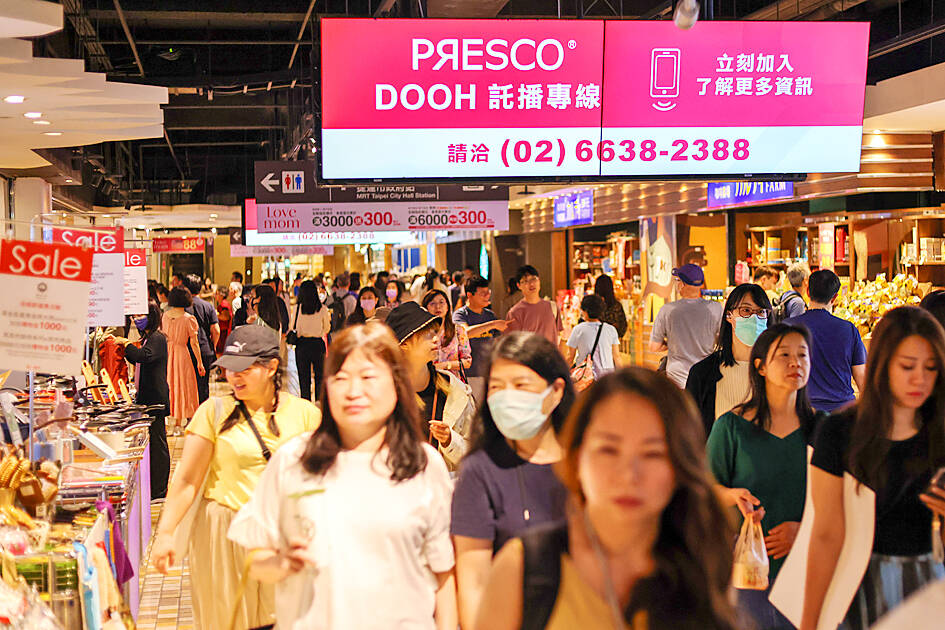Sales in the retail, and food and beverage sectors last month increased 2.4 percent and 4.1 percent respectively from a year earlier, accelerating from gains of 1.6 percent and 0.7 percent the previous month, the Ministry of Economic Affairs said yesterday.
Retail sales were NT$400.9 billion (US$12.38 billion) last month, rising on an annual basis for the 33th consecutive month and the highest sales figure on record for the month of May, ministry data showed.
Sales were driven mainly by increased consumption at supermarkets, convenience stores and hypermarkets, as well as e-commerce sites, cosmetics outlets, automobile vendors and apparel shops, despite a drop in sales at department stores, information technology and consumer electronics shops, and fuel retail outlets, the ministry said in a report.

Photo: Ritchie B. Tongo, EPA-EFE
In the first five months of this year, retail sales totaled NT$1.97 trillion, up 3.1 percent from a year earlier and the highest figure over the period, it said.
Sales in the food and beverage sector reached NT$84.9 billion last month, increasing year-on-year for the fourth consecutive month and a record for the month of May, the ministry said.
The ministry attributed the showing to Mother’s Day boosting restaurant sales, promotional activities that boosted beverage sales and steady demand for in-flight meals, which supported catering services.
From January to last month, food and beverage sales rose 4.8 percent year-on-year to NT$429 billion, also the highest figure for the five-month period on record, the ministry said.
Sales in the two sectors this month are expected to increase further, benefiting from Dragon Boat Festival promotions, school graduation events and the launch of new vehicle models, it said.
Retail sales this month are expected to grow 1 to 4 percent year-on-year to between NT$390.6 billion and NT$402.2 billion, while food and beverage sales would increase 3.8 to 6.8 percent to between NT$84.5 billion and NT$87 billion, the ministry said.
As for the wholesale sector, sales last month grew 12.6 percent annually to NT$1.08 trillion, increasing for a third straight month, on the back of rising shipments of machinery equipment, chemical materials, food and tobacco products, and clothes and apparel, the report said.
The increase was mainly due to customer demand for artificial intelligence and high-performance computing applications, inventory replenishment by non-tech manufacturers and restocking by channel clients ahead of the Dragon Boat Festival, the report said.
Cumulative sales in the first five months of the year grew 10.1 percent to NT$5.18 trillion, and sales this month would rise 10.3 to 13.3 percent annually to between NT$1.08 trillion and NT$1.11 trillion, the ministry said.

TARIFF TRADE-OFF: Machinery exports to China dropped after Beijing ended its tariff reductions in June, while potential new tariffs fueled ‘front-loaded’ orders to the US The nation’s machinery exports to the US amounted to US$7.19 billion last year, surpassing the US$6.86 billion to China to become the largest export destination for the local machinery industry, the Taiwan Association of Machinery Industry (TAMI, 台灣機械公會) said in a report on Jan. 10. It came as some manufacturers brought forward or “front-loaded” US-bound shipments as required by customers ahead of potential tariffs imposed by the new US administration, the association said. During his campaign, US president-elect Donald Trump threatened tariffs of as high as 60 percent on Chinese goods and 10 percent to 20 percent on imports from other countries.

Taiwanese manufacturers have a chance to play a key role in the humanoid robot supply chain, Tongtai Machine and Tool Co (東台精機) chairman Yen Jui-hsiung (嚴瑞雄) said yesterday. That is because Taiwanese companies are capable of making key parts needed for humanoid robots to move, such as harmonic drives and planetary gearboxes, Yen said. This ability to produce these key elements could help Taiwanese manufacturers “become part of the US supply chain,” he added. Yen made the remarks a day after Nvidia Corp cofounder and chief executive officer Jensen Huang (黃仁勳) said his company and Taiwan Semiconductor Manufacturing Co (TSMC, 台積電) are jointly

United Microelectronics Corp (UMC, 聯電) expects its addressable market to grow by a low single-digit percentage this year, lower than the overall foundry industry’s 15 percent expansion and the global semiconductor industry’s 10 percent growth, the contract chipmaker said yesterday after reporting the worst profit in four-and-a-half years in the fourth quarter of last year. Growth would be fueled by demand for artificial intelligence (AI) servers, a moderate recovery in consumer electronics and an increase in semiconductor content, UMC said. “UMC’s goal is to outgrow our addressable market while maintaining our structural profitability,” UMC copresident Jason Wang (王石) told an online earnings

MARKET SHIFTS: Exports to the US soared more than 120 percent to almost one quarter, while ASEAN has steadily increased to 18.5 percent on rising tech sales The proportion of Taiwan’s exports directed to China, including Hong Kong, declined by more than 12 percentage points last year compared with its peak in 2020, the Ministry of Finance said on Thursday last week. The decrease reflects the ongoing restructuring of global supply chains, driven by escalating trade tensions between Beijing and Washington. Data compiled by the ministry showed China and Hong Kong accounted for 31.7 percent of Taiwan’s total outbound sales last year, a drop of 12.2 percentage points from a high of 43.9 percent in 2020. In addition to increasing trade conflicts between China and the US, the ministry said